Over the Years
Home > Over the Years > Over the Fiscal Years (2020 APR -) > Four Medical Professionals from Latvia and U.S. Invited for Training
Four Medical Professionals from Latvia and U.S. Invited for Training
HICARE invited a researcher from Latvia and 3 doctors from U.S. for the research of Molecular biology and the medical treatment of radiation-exposed.
Names and Titles:
| Nama | Affiliation | Title |
| Laura Komarovska | Laboratory Hygiene and Occupation Diseases, Riga Staradins University | Researcher |
| Kelley Hutchins | Pediatric Hematology/ Oncology, University of Hawaii | Assistant Professor |
| Lynn Iwamoto | Department of Pediatrics, University of Hawaii | Associate Professor |
| Steven Jonas | Division of Pediatric Hematology/Oncology, UCLA | Clinical Instructor |
Period of Training:
Participant 1
November 25 to December 20, 2019
Participant 1 ~ 4
December 16 to 20, 2019
Training Organization (in order of visits):
< November 25 to December 13 > Participant 1
Radiation Effects Research Foundation
< December 16 to 20 > All of the trainees
Hiroshima City Office,
Hiroshima University Hospital (Advanced Emergency and Critical Care Center),
Funairi Mutsumi-en (Nursing Home for A-bomb survivors),
Hiroshima Atomic Bomb Casualty Council,
Hiroshima University Research Institute for Radiation Biology and Medicine,
Radiation Effects Research Foundation
Hiroshima Red Cross Hospital & Atomic-bomb Survivors Hospital,
Hiroshima Peace Memorial Museum, etc.
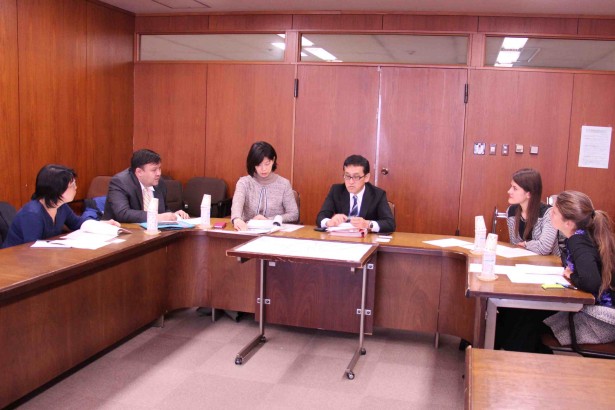
With Research Division Director Madokoro (center right), Atomic Bomb Survivors Relief Department of Hiroshima City.
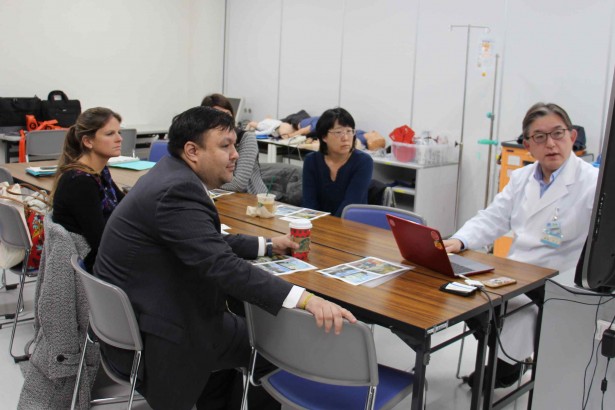
With Professor Nobuyuki Hirohashi (Right) of Advanced Emergency and Critical Care Center, Hiroshima University Hospital.
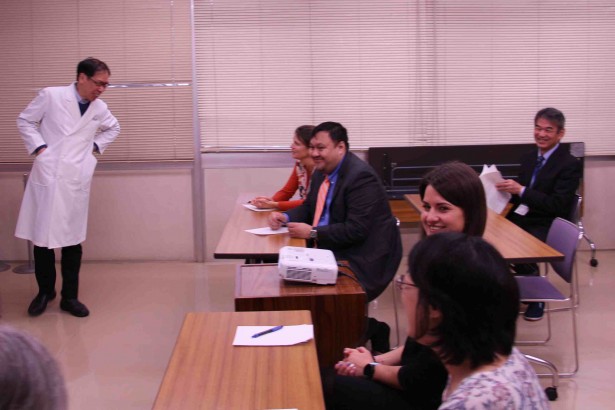
Dr. Arita (left) gave a lecture at Funairi Mutsumien, nursing home of Hiroshima A-bomb Survivors Relief Foundation.
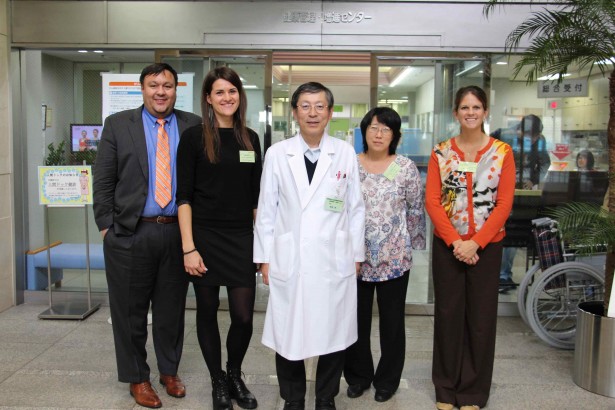
With Dr. Ryo Maeda (center), Director of Health Management & Promotion Center, Hiroshima Atomic Bomb Casualty Council.
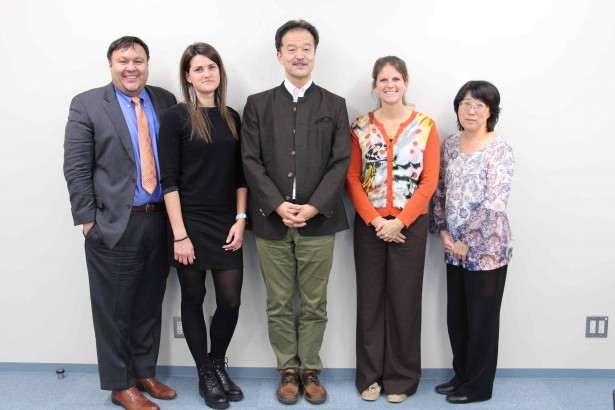
With Prof. Tashiro (left), Director, Hiroshima University Research Institute for Radiation Biology and Medicine.
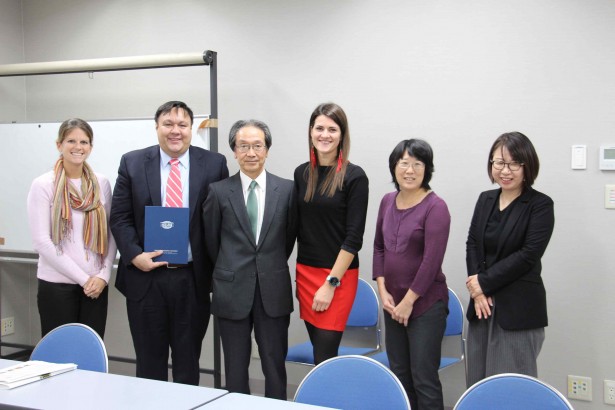
With Dr. Kashiwado (center left), Vice President of Hiroshima Red Cross Hospital & Atomic-bomb Survivors Hospit
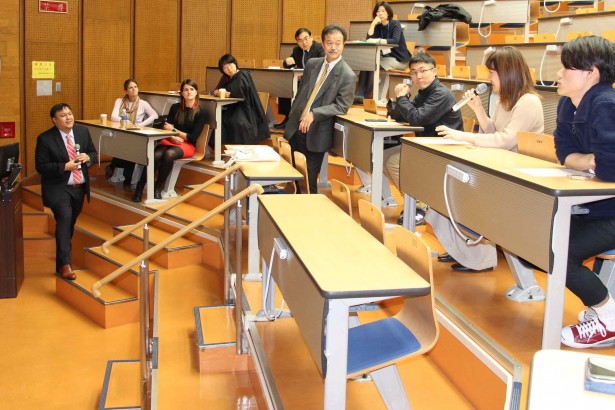
Exchang meeting with medical students.
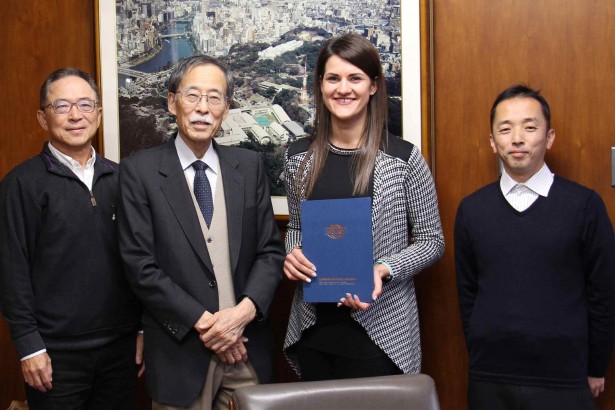
Chairman Niwa gave a certificate at RERF. With Assist. Department Chief Hayashi (left) and Dr. Hamasaki (right)
Feedback
- Actually I learned so much more than I expected. I learned a lot of about radiation effects. We learned how to separate lymphocytes, extract DNA, did SNP assay, ROS analyses, cell harvest, chromosome’s slide preparation, learned about FISH method – how to prepare samples, how to use painting method, also used microscopes to find targeted chromosomes. We learned about Giemsa-staining method and chromosome aberrations and tried to find metaphases using microscopes. I learned much about biodosimetric studies of atomic bomb survivors.
- The education regarding adverse effects of radiation exposure, acute and long-term, was very relevant to my field of medical practice in which we use radiation almost daily with our patients, obtaining imaging studies that utilize radiation, as well as a modality of treatment for many of our patients with cancer. We learn about and are aware of adverse effects of radiation exposure, but to be able to learn of such extremes that were caused as a result of the atomic bombing, as well as of the significant lasting effects (physical, emotional, psychological) brought new information and perspective on what terrible ailments may and have occurred. I will try to continue to be especially mindful when exposing patients to radiation and ensure it is utilized only when necessary due to potential adverse effects.
- The visit to the nursing home and sharing by the survivor was most impactful. I am grateful and honored to have met her.
Talks by researchers were very informative and helped to understand how far-reaching the effects are.
I would have also liked to hear more about the difficulties encountered by the research foundation (RERF) and hospitals; the psychologic effects on the people, and the social support system.
(After Training,) I would like to learn more about the effects on children and future generations. Whatever I can learn will help in counseling parents prenatally and caring for newborns in the case of potential exposure but also in other extremely stressful and fearful situations.
- As a physician scientist, I hope to share what I have learned here with our students and colleagues at my academic institution, raising their awareness of health effects of radiation exposure from nuclear weapons/incidents.
I hope that these interactions will inspire new efforts to engage both scientifically and clinically to build
collaborative linkages with Japanese researchers and clinicians.




